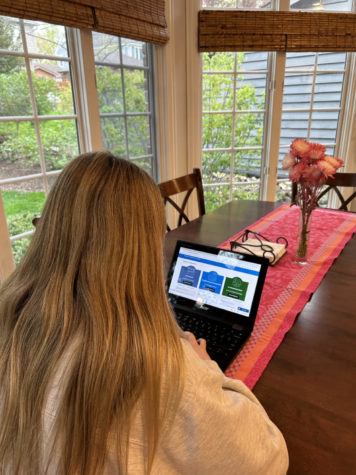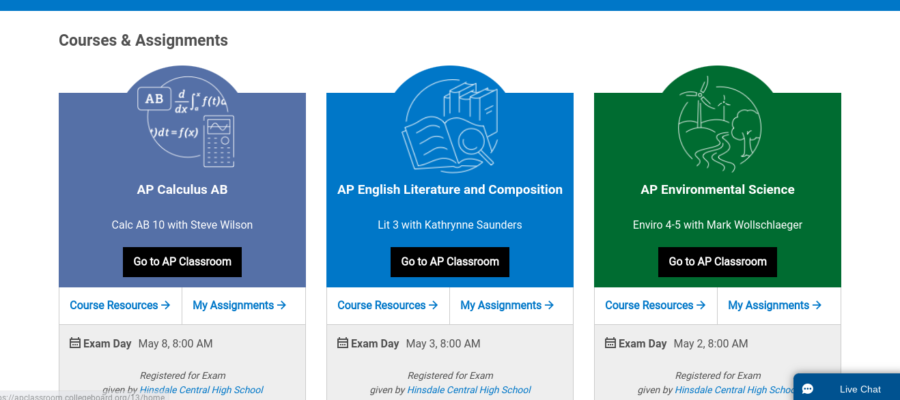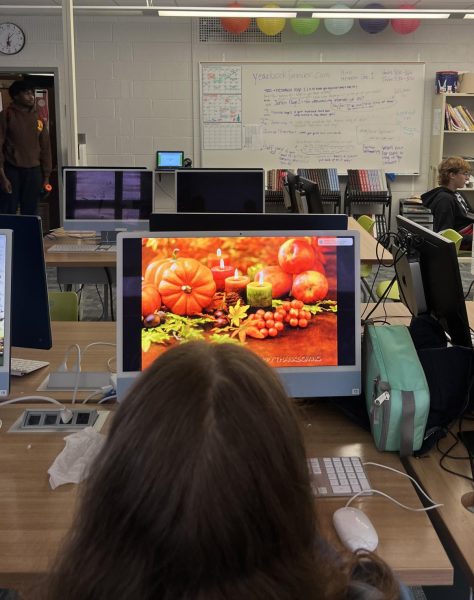AP exam Q&A
AP exams start Monday, May 1 and go for two weeks.
AP exams start Monday, May 1 and students are getting prepared to ace their tests. Seniors Paige Lambert (PL) and Aadit Bhavsar (AB) who have been in a variety of AP classes throughout their high school years, answered some questions about the AP tests.
What AP Classes are you in this year?
PL: This year I am taking AP Psychology.
AB: This year I am taking 6 AP classes: AP Environmental Science, AP Macroeconomics, AP Government and Politics, AP Art History, AP Literature, AP French
Did you take AP exams last year? How did you study for those?
PL: Yes. Last year I took the AP US History (APUSH) and AP Lang exams. I studied for APUSH by watching the Heimler’s History review videos, going through quizlets from each unit, and reviewing terms and events from the unit objective sheets that I was given. For AP Lang, I looked over the previous essays I wrote and took several practice tests on AP Classroom for the MCQ.
AB: Last year I took 5 AP exams. I studied pretty rigorously for these exams. I started about 3 weeks in advance to start studying. I began by overlooking notes, then previous exams, and finally looked at practice tests to become more acquainted with the exam and forms of questions.
What have you been doing in class throughout the year that has helped you prepare for exams?
PL: In AP Psych, we are assigned a few pages to read in the textbook each night along with taking notes on the main ideas. We are given reading quizzes every few days to make sure we don’t fall behind and it helps keep us on track. Each test is designed to replicate questions similar to the exam and we often do FRQs to make sure we are fully prepared.
AB: Throughout the year I have been taking notes on large ideas. I try not to focus too much on small details but rather focus on the larger connections between multiple units. I have also been bookmarking videos that have been helpful so I do not have to waste time looking for videos.
Do you feel like your teachers prepared you for your exam?
PL: For the most part, yes. APUSH and AP Psych are courses that are filled with hundreds of terms and events that we have to remember, so my teachers did their best to engrave each thing into our brains. By using mnemonic devices and showing clips from shows that relate to the topics we learned, I was/am able to have ways to easily remember difficult concepts. As for AP Lang, my teacher guided us through each essay we had to write and sat with us individually to go over how to improve our skills.
AB: I feel like it depends on the class. Some teachers have been on top of creating a good plan for students and providing ample time to prepare. Other teachers however, leave minimal room to review and even have tests days before the AP exam.

How are you studying this year for the AP exams?
PL: I will look over the worksheets we did in class for each unit to refresh my memory on difficult terms, go through the quizlets from each unit, and take the several practice tests that my teacher has given us.
AB: This year I have started slightly later on studying, but this year I have bought practice and review books from the Princeton review. This is because I have to have a structured review and make sure that I do not miss anything I forgot to take notes on.
What is your advice for students taking their first AP classes next school year?
PL: AP courses are structured very differently than a regular class and might take a little while to adapt to, but if you dedicate a small amount of time each night to your homework/assignments, your chances of success are much higher than if you are to procrastinate. Also, If something is difficult to remember, try applying it to something in your own life or writing it down somewhere you look often and it should be a lot easier to remember.
AB:I would say one major piece of advice is taking notes throughout the class year. These notes will be so helpful for semester finals but also it will keep you organized for when the AP test does arrive. Also ask questions during class and during review, it is better to know as much as possible before the test.
What are some of your strategies while you take the tests?
PL: Don’t waste your time trying to analyze each question in depth. Cross out the obviously incorrect answers first and then pick the one that relates most to the question. You don’t have to get 100% of the answers correct to get a 4 or a 5, so don’t take too long stressing over one question and move on to the next.
AB: I think 2 main strategies I have are managing time really well on the test. Make sure you are following time on the multiple choice and the free response questions. Also, if you are gonna guess, do not just guess randomly, look for keywords in the question that may relate to the answer options. Finally, just breather while taking the test, you do not have to get every answer right, just focus on getting as many points you can rather than wasting all your time on one question
Katherine Saunders (KS) has been teaching AP English for 10 years and served as an AP reader for three years.
How have you been preparing your students for the AP exams throughout the school year and in the last couple weeks prior to the exam?
KS: While I do not consider my class to be a test prep course, almost everything we do helps in preparing students to take the AP test. We use all the skills that are tested throughout the year, sometimes explicitly, like when we do close reading questions and write a timed poetry analysis, but we also build skills through reading challenging literature, writing about connections and observations, and through discussions of different types of texts.
What is your advice for students taking their first AP classes next school year?
KS: For students new to AP, my best advice is to believe in yourself! If you’ve chosen to take an AP course, it may be challenging, but it will also help you see just how capable you are. I would also recommend taking advantage of opportunities your teacher offers, like resources, office hours, or feedback.
With AP exams underway, students will now have to wait until July to receive their scores from The College Board.

Ellie Ursillo, senior, is excited to be writing for Devil’s Advocate this year. Ellie is a Co-Captain of the Poms team this season and is looking forward...

Simrah Qasim, senior, is excited to be returning to devil's advocate. She loves listening to music, writing, and playing the piano. Along with Devil’s...













